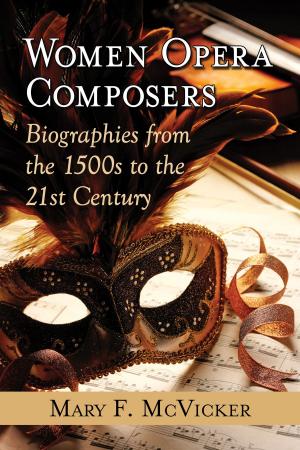Masculinity in the Golden Age of Swedish Cinema
A Cultural Analysis of 1920s Films
Nonfiction, Entertainment, Performing Arts, Film, Social & Cultural Studies, Social Science| Author: | Tommy Gustafsson | ISBN: | 9781476617121 |
| Publisher: | McFarland & Company, Inc., Publishers | Publication: | October 21, 2014 |
| Imprint: | Language: | English |
| Author: | Tommy Gustafsson |
| ISBN: | 9781476617121 |
| Publisher: | McFarland & Company, Inc., Publishers |
| Publication: | October 21, 2014 |
| Imprint: | |
| Language: | English |
Swedish society underwent great changes during the first decades of the 1900s and the new consumption and entertainment culture came under fire. Children and youth—but also women and the working classes—become symbols of the forces breaking down traditional structures and values. These groups were also identified as the principal audience for the new film medium. Hence, during the silent era, film culture interacted with society at large, filling the screen with contradictory images of diverging masculinities and gender/ethnic relations. In fact, film culture became one of the most important arenas where new gender relations could be articulated. This book covers Swedish film culture throughout the 1920s. It is the first in-depth exploration of Swedish silent film culture that goes beyond the small number of canonized films of the “Swedish Golden Age” that have been discussed as “art” for nearly 100 years. The study is based on extensive research and takes all Swedish feature films produced in the 1920s into consideration, together with a large number of source materials that include fan and trade magazines, manuscripts, censorship records, government reports and some 900 film reviews.
Swedish society underwent great changes during the first decades of the 1900s and the new consumption and entertainment culture came under fire. Children and youth—but also women and the working classes—become symbols of the forces breaking down traditional structures and values. These groups were also identified as the principal audience for the new film medium. Hence, during the silent era, film culture interacted with society at large, filling the screen with contradictory images of diverging masculinities and gender/ethnic relations. In fact, film culture became one of the most important arenas where new gender relations could be articulated. This book covers Swedish film culture throughout the 1920s. It is the first in-depth exploration of Swedish silent film culture that goes beyond the small number of canonized films of the “Swedish Golden Age” that have been discussed as “art” for nearly 100 years. The study is based on extensive research and takes all Swedish feature films produced in the 1920s into consideration, together with a large number of source materials that include fan and trade magazines, manuscripts, censorship records, government reports and some 900 film reviews.















